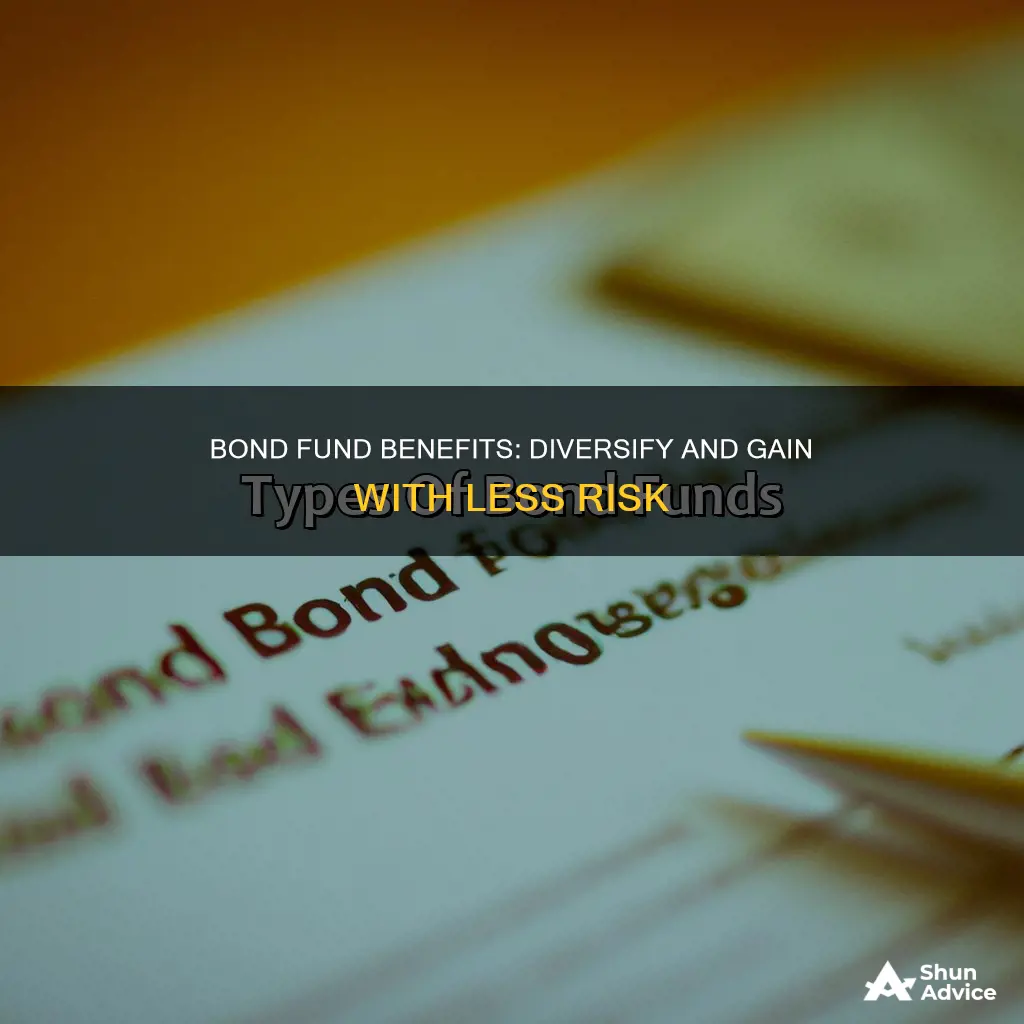
Investing in a bond fund is an alternative to buying individual bonds. A bond fund is a mutual fund or an exchange-traded fund (ETF) that buys and sells debt instruments like government and corporate bonds. Bond funds are an attractive option compared to buying individual bonds as they provide greater portfolio diversification than an individual investor could manage independently. They are also a more efficient way of investing than buying individual bond securities.
| Characteristics | Values |
|---|---|
| Primary goal | Generate monthly income for investors |
| Investor's alternative | Buying individual bonds |
| Investment type | Portfolio of fixed-income securities |
| Investor's control | Low |
| Research and oversight | Low |
| Income frequency | Monthly |
| Minimum investment | Low |
| Liquidity | High |
| Impact of rising or falling interest rates | Potentially greater |
| Management | Professional |
| Tax-free income | Possible |
What You'll Learn

Greater diversification with a lower financial commitment
Investing in a bond fund is a more efficient way of investing in bonds than buying individual securities. Bond funds, such as mutual funds or exchange-traded funds (ETFs), invest in a variety of bonds, including corporate, municipal, and government bonds. They provide greater diversification for investors with a lower financial commitment.
Bond funds have a lower minimum investment amount, typically ranging from a few hundred to a few thousand dollars, making them more accessible to individual investors. By pooling your money with other investors, you gain access to a diversified portfolio of bonds that would be challenging to achieve on your own with a small investment. This diversification helps to reduce risk by spreading your investments across multiple bonds.
Additionally, bond funds offer professional management. Experienced portfolio managers and analysts have the expertise and tools to research the creditworthiness of bond issuers and analyze market conditions before making investment decisions. They actively manage the fund, buying and selling bonds according to market conditions, to optimize returns.
With bond funds, you also benefit from liquidity and convenience. You can buy or sell your fund shares daily, providing flexibility and easy access to your investments. Furthermore, bond funds typically pay regular monthly income, making them suitable for investors seeking stable and consistent cash flow.
It is important to note that while bond funds provide greater diversification and lower financial commitment, they also come with reduced control over your investments. The fund manager makes the investment decisions, and you may not have a say in the specific bonds held in the fund. Therefore, it is crucial to carefully select a fund that aligns with your investment goals and risk tolerance.
U.S. Investment Fund Transition to Schwab: What, When, Why?
You may want to see also

Less control over the portfolio
Investing in a bond fund means you have less control over your portfolio. This is because, unlike buying individual bonds, you are buying shares in a fund that buys and sells many bonds. The fund manager makes the decisions about which bonds to buy and sell, and when, according to market conditions. While funds always have stated objectives and guardrails around what they may invest in, you don't have control over exactly what the fund holds.
For example, a fund manager may replace bonds when the issuer's credit is downgraded or when the issuer "calls", or pays off the bond, before its maturity date. While mutual funds must publish their complete holdings periodically, this is often only available a few times a year and with a lag.
Bond funds are therefore a good option for those who want a more hands-off approach to investing. They are also a good option for those who want to achieve broad diversification with a lower dollar commitment. However, for those who want more control over their portfolio, buying individual bonds may be a better option. This gives you total control over what you own, but it also comes with the responsibility of managing that portfolio.
Dividend Funds: When to Invest for Maximum Returns
You may want to see also

Reduced research and oversight
One of the key benefits of investing in a bond fund is the reduced level of research and oversight required compared to investing in individual bonds. While you may want to do a thorough comparison of available funds and the track records of various managers, you don't need to research individual bonds or issuers. This is because a bond fund is a mutual fund or an exchange-traded fund (ETF) that buys and sells debt instruments like government and corporate bonds. The fund manager typically buys and sells bonds according to market conditions and rarely holds them until maturity.
For example, a fund manager may replace bonds when the issuer's credit is downgraded or when the issuer "calls," or pays off the bond, before its maturity date. This level of oversight is more manageable than researching and monitoring the financial stability of individual bond issuers, determining if each bond's price is reasonable, and building a portfolio that aligns with your risk tolerance and income needs.
Additionally, bond funds provide access to professional portfolio managers who have the expertise to research and analyze the creditworthiness of bond issuers and market conditions. This can be particularly valuable for investors who may not have the time or expertise to conduct such research and analysis on their own.
Furthermore, bond funds offer diversification for investors with a low required minimum investment. This means that, even with a small initial investment, you can gain exposure to a diverse range of bonds, reducing the overall credit risk of your portfolio.
Index Funds: Long-Term Investment Strategies Explored
You may want to see also

Access to professional portfolio managers
Investing in a bond fund gives you access to professional portfolio managers with the expertise and technology to research the creditworthiness of bond issuers and analyse market information before making investment decisions.
Professional portfolio managers can help you build a diversified portfolio, which is a vital part of investing. Diversification can reduce the overall credit risk of a portfolio, and achieving broad diversification can be more cumbersome with individual bonds.
Bond funds are an attractive option compared to buying individual bonds. They provide greater portfolio diversification than an individual investor could manage independently. By investing in a bond fund, you can benefit from the expertise of professional portfolio managers who will make investment decisions on your behalf.
Professional portfolio managers have the resources to conduct in-depth research and ongoing monitoring of the financial stability of bond issuers. They can help you navigate the complex world of fixed-income investments and make informed decisions about buying and selling bonds. They will also help you understand the impact of interest rate changes on your bond investments and adjust your portfolio accordingly.
Additionally, professional portfolio managers can provide guidance on the different types of bond funds available, such as US government bond funds, municipal bond funds, corporate bond funds, mortgage-backed securities (MBS) funds, high-yield bond funds, emerging market bond funds, and global bond funds. They can help you assess your risk tolerance, investment goals, and time horizon to determine the most suitable bond funds for your portfolio.
In summary, investing in a bond fund gives you access to professional portfolio managers who can provide valuable insights, expertise, and guidance in the complex world of fixed-income investments. They can help you build a diversified portfolio, navigate market conditions, and make informed investment decisions.
The Best Time to Invest in Funds: Morning or Evening?
You may want to see also

Potential for tax-free income
Municipal bond funds are known to offer tax-free income. The interest earned from municipal bonds is tax-free at the federal level and may also be tax-exempt at the state and local levels. This is especially beneficial for investors in higher tax brackets.
Municipal bonds are issued by a city, town, or state to raise money for public projects such as schools, roads, and hospitals. There are two types of municipal bonds: general obligation and revenue.
General obligation bonds are used to fund projects that do not produce income, such as playgrounds and parks. The issuer can take the necessary measures to guarantee payments on the bonds, such as raising taxes. Revenue bonds, on the other hand, pay back investors with the income generated by the projects they finance. For example, a state may use the funds generated by tolls to pay bondholders if it issues revenue bonds to finance a new highway.
It is important to note that municipal bond funds are usually not suitable for tax-advantaged accounts like IRAs.
Mutual Fund Lump Sum Investments: Where to Begin?
You may want to see also







